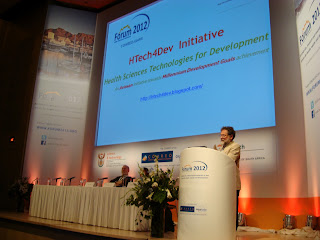AMREF is an
international African organization headquartered in Nairobi, Kenya.
We had the
great opportunity to meet with two representatives of AMREF in Paris: Dr Mor
NGOM, Program Coordinator in West Africa (Senegal) and Silvia TOLVE in charge
of programs in France.
We were
mostly interested in their experience with telemedicine in Senegal. They used
to work with the telemedicine service, part of the Minsitry of Health, and are
willing to pursue their collaboration to share their experience and expertise:
a reference center has been built in Dakar and several projects have been set
up with local hospitals to develop e-health in the area. A convention has been
prepared with the previous government and should be discussed again soon.
AMREF was
also involved in the SAHEL project led by European Space Agency (ESA) in Kenya.
The SAHEL project proposes an efficient cooperation between technological
players (industries, operators), health stakeholders (health workers, nurses,
specialists...), centers of excellence providing medical content for eLearning
and NGOs for local implementation with the support of regional actors.
We agreed
to collaborate on the construction of the telemedicine project in Senegal with
Prof. Mbayang NDIAYE NIANG and the new Ministry of Health led by Prof. Awa
Marie COLL SECK. Moreover, we plan to work together on other proposals by
sharing expertise and network.








